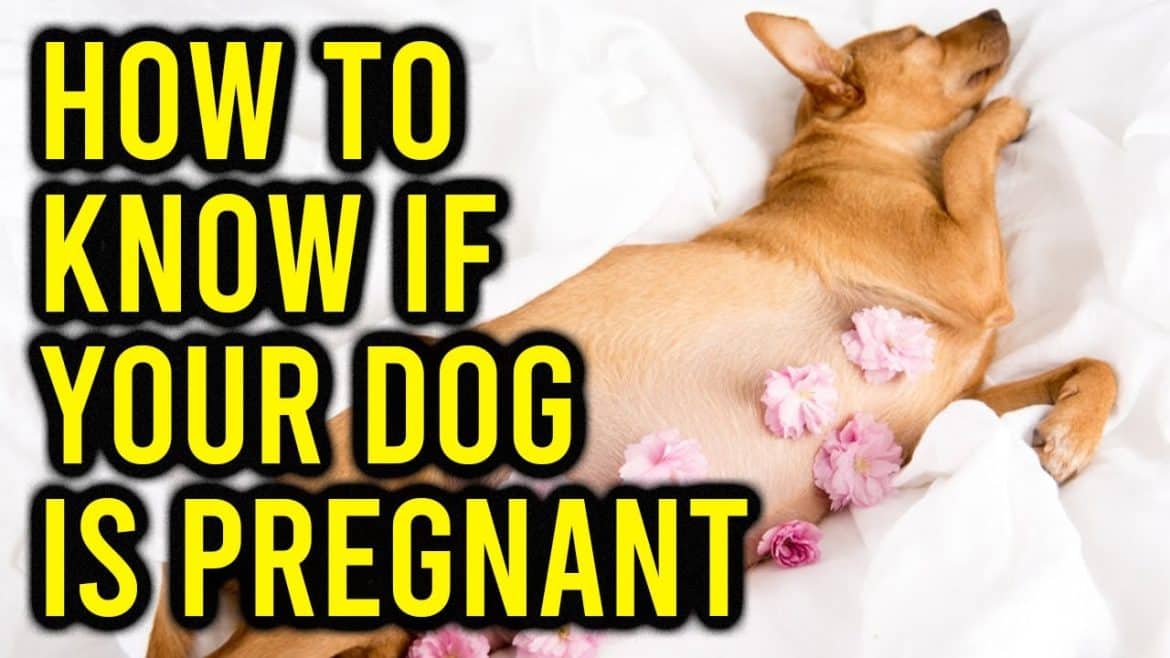So, you've noticed a few changes in your furry friend lately and you're starting to wonder if she might be expecting some adorable little puppies. It's an exciting thought, but how can you be sure? In this article, we'll walk you through some telltale signs to look out for to help you determine if your dog is indeed pregnant. From physical changes to behavioral cues, we'll give you all the information you need to keep an eye out for before those sweet little bundles of joy arrive.
Observing Physical Signs
Changes in Nipple Appearance
One of the earliest signs of pregnancy in dogs is the changes in their nipple appearance. As the body prepares for pregnancy, the nipples may become darker and more prominent. You may also notice that the area surrounding the nipples, known as the mammary glands, begins to swell and feel firm to the touch. These changes occur due to the increased blood flow and hormonal changes in the dog's body.
Abdominal Enlargement
As the pregnancy progresses, you may notice that your dog's abdomen becomes larger and more rounded. This is a natural result of the growing puppies inside. It is important to note that not all dogs show significant abdominal enlargement, especially in the early stages of pregnancy. However, if you observe a gradual increase in the size of your dog's belly over time, it could be a strong indicator of pregnancy.
Weight Gain
An increase in weight can also be observed in pregnant dogs. This weight gain is primarily due to the growing puppies, increased fluid retention, and the development of mammary glands. It is important not to confuse weight gain with obesity in dogs, as pregnant dogs require proper nutrition and a healthy weight gain to support the growing puppies. Monitoring weight gain in conjunction with other physical signs can help confirm pregnancy.
Monitoring Behavioral Changes
Decreased Appetite
During the early stages of pregnancy, some dogs may experience a decrease in appetite. This can be attributed to hormonal changes or morning sickness-like symptoms. While it is not uncommon for pregnant dogs to have a slightly reduced appetite, any significant decrease should be monitored closely and reported to your veterinarian.
Nesting Behavior
As the pregnancy progresses, you may observe your dog exhibiting nesting behavior. This includes seeking out a quiet and comfortable space to create a nest for herself and her puppies. She may gather blankets, pillows, or other soft materials and arrange them carefully. This behavior is instinctual and indicates that your dog is preparing for the arrival of her puppies.
Increased Affection
Some pregnant dogs may become more affectionate and seek more attention from their owners. They may become clingy and want to be closer to you than usual. This change in behavior is likely due to hormonal changes and the emotional bond between the dog and her owner. Showering your dog with extra love and attention during this time can help her feel secure and content.

This image is property of www.wikihow.com.
Keeping Track of Veterinary Visits
Schedule a Vet Appointment
Once you suspect that your dog may be pregnant, it is important to schedule a veterinary appointment. Your veterinarian will be able to confirm the pregnancy and guide you through the entire process. They will also provide you with valuable information on proper care, nutrition, and any potential risks associated with pregnancy.
Physical Examination
During the veterinary visit, your dog will undergo a physical examination to assess her overall health and confirm the pregnancy. The veterinarian will palpate your dog's abdomen, feeling for the presence of developing puppies. They will also check for any signs of infection or abnormalities that may require attention. This examination is crucial in determining the stage of pregnancy and ensuring the well-being of both the mother and the puppies.
Ultrasound or X-ray
Depending on the stage of pregnancy, your veterinarian may recommend additional diagnostic tests such as an ultrasound or an x-ray to evaluate the puppies' development. An ultrasound can detect the presence of embryos and confirm pregnancy as early as 18 to 20 days after mating. On the other hand, an x-ray is typically performed later in the pregnancy to estimate the number of puppies and evaluate their size and positioning.
Understanding Dog Pregnancy Timeline
Gestation Period
The average gestation period for dogs is approximately 63 days, although it can range from 58 to 68 days. It is important to note that this timeline may vary slightly depending on the individual dog and breed. Understanding the gestation period is crucial in preparing for the arrival of the puppies and monitoring their development.
Stage 1 - Proestrus
The first stage of the dog's reproductive cycle is known as proestrus. During this stage, which can last for up to 14 days, the dog's body prepares for ovulation. The most noticeable sign of proestrus is a swollen vulva and a bloody discharge. However, breeding during this stage is not recommended, as the eggs are not yet ready for fertilization.
Stage 2 - Estrus
Estrus, also known as the heat cycle, follows proestrus and lasts for an average of 9 days. This is the stage when the female dog is receptive to mating and can become pregnant. Signs of estrus include a change in behavior, increased urination frequency, and a reduction in the bloody discharge. This is the optimal time for breeding if pregnancy is desired.
Stage 3 - Diestrus
Diestrus is the final stage of the reproductive cycle, lasting approximately 60 to 90 days in pregnant dogs. During this stage, the dog's body focuses on nurturing the developing puppies. The hormonal levels stabilize, and the dog's behavior returns to normal. If the dog is not pregnant, diestrus will typically last for about 60 to 90 days before the cycle starts again.

This image is property of www.thesprucepets.com.
Home Pregnancy Tests for Dogs
Testing Methods
Home pregnancy tests for dogs are available in various forms, including urine test kits and blood test kits. These tests detect the presence of the hormone relaxin, which is produced by the developing placenta. To perform a urine test, collect a urine sample from your dog and follow the instructions provided with the test kit. Blood tests, on the other hand, require a small blood sample collected by your veterinarian.
Accuracy of Tests
Home pregnancy tests for dogs can provide a reliable indication of pregnancy. However, it is important to note that false negatives or false positives can occur. Factors such as the timing of the test and even user error can impact the accuracy of the results. If you receive a positive result from a home pregnancy test, it is essential to confirm the findings with a professional veterinary diagnosis.
Professional Pregnancy Diagnosis
Blood or Urine Test
Professional veterinary diagnosis of pregnancy often involves blood or urine tests. Similar to the home pregnancy tests, these tests detect the presence of the hormone relaxin. However, professional tests tend to be more accurate and reliable due to the expertise and equipment used. Your veterinarian will collect a blood or urine sample and send it to a laboratory for analysis.
Hormone Level Analysis
The blood or urine samples collected by your veterinarian will be analyzed to determine the hormone levels in your dog. This analysis provides a more precise measurement of the hormone relaxin and confirms the pregnancy. Professional tests can accurately determine pregnancy as early as 25 to 30 days after mating, providing valuable information for proper care and monitoring.
Reliability of Professional Diagnosis
Professional diagnosis of pregnancy is generally more reliable than home pregnancy tests. However, it is still important to consult with your veterinarian and consider the timing of the test in relation to the dog's reproductive cycle. Early testing may result in false negatives, while testing too late can reduce the options for managing any potential complications.

This image is property of irp.cdn-website.com.
Pregnancy Complications and Health Risks
Ectopic Pregnancy
Ectopic pregnancy is a relatively rare complication in dogs, but it can occur. In an ectopic pregnancy, the fertilized egg implants outside of the uterus, such as in the fallopian tubes or abdomen. This can lead to serious health risks for the mother and the puppies. If you notice any signs of distress or abnormal behavior in your pregnant dog, it is essential to seek veterinary attention immediately.
Pyometra
Pyometra is a potentially life-threatening infection of the uterus that commonly occurs in older, unspayed female dogs. It can also occur during pregnancy or in the weeks following delivery. Signs of pyometra include lethargy, decreased appetite, increased thirst, and a swollen abdomen. If you suspect your dog may have pyometra, it is crucial to seek veterinary treatment promptly.
Pregnancy Toxemia
Pregnancy toxemia, also known as ketosis or pregnancy ketosis, is a metabolic disorder that can affect pregnant dogs. It typically occurs during late pregnancy when the body's energy demands increase. Signs of pregnancy toxemia include loss of appetite, weight loss, lethargy, and weakness. This condition requires immediate veterinary attention to prevent complications for the mother and the developing puppies.
Preparing for the Arrival of Puppies
Creating a Whelping Area
Preparing a designated whelping area for your dog is crucial for a safe and comfortable birthing experience. Ideally, this area should be quiet, warm, and easily sanitized. Provide your dog with a large, clean, and lined whelping box or crate where she can give birth and nurse the puppies. Ensure there is enough space for the mother and the puppies to move around comfortably.
Gathering Necessary Supplies
In preparation for the arrival of the puppies, gather essential supplies such as clean towels, heating pads, a digital thermometer, and a scale for weighing the puppies. Have a supply of clean bedding materials, puppy formula, and feeding bottles ready in case additional support is required. It is also advisable to have the contact information of a veterinarian or an emergency animal hospital readily available.
Planning for Pregnancy Expenses
Pregnancy and the care of newborn puppies can be associated with various expenses. Prepare a budget for the costs of veterinary visits, prenatal care, vaccinations, and potential emergency situations. Additionally, consider the costs of high-quality puppy food, bedding materials, and any necessary supplements. Planning ahead financially can help ease any unexpected financial burdens during this time.

This image is property of i.ytimg.com.
Special Care and Nutrition for Pregnant Dogs
Balanced Diet
A balanced and nutritious diet is crucial for the health of pregnant dogs and the development of their puppies. Consult with your veterinarian to determine the appropriate diet for your dog during pregnancy. Generally, pregnant dogs require a diet that is higher in calories, protein, and essential nutrients. High-quality commercial dog food formulated for pregnant or nursing dogs is often recommended.
Increased Hydration
Pregnant dogs may have an increased need for water due to the physical changes happening in their bodies. Always provide fresh and clean water for your dog, ensuring that it is easily accessible. Monitor her water intake and consult with your veterinarian if you notice any significant changes, such as excessive drinking or decreased water consumption.
Exercise and Rest
While pregnant, dogs require a balance of exercise and rest. Moderate exercise helps maintain muscle tone and general well-being, but it is essential to avoid strenuous activities or excessive jumping. Provide your pregnant dog with short and regular walks to keep her physically active. Additionally, ensure that she has a quiet and comfortable space where she can rest and sleep undisturbed.
Monitoring the Progress of Pregnancy
Regular Weighing
Weight monitoring is an important aspect of tracking the progress of your dog's pregnancy. Regularly weigh your dog during pregnancy, keeping a record of her weight gain. Sudden or excessive weight loss or weight gain can be indicative of potential health issues. Consult with your veterinarian if you notice any significant changes in your dog's weight.
Ongoing Observation of Physical Signs
Continuously observe the physical signs discussed earlier, such as nipple changes, abdominal enlargement, and weight gain. These signs should continue to progress as the pregnancy advances. If you notice any sudden changes or abnormalities, it is essential to consult with your veterinarian. Regularly documenting and reporting these observations can help ensure the well-being of your pregnant dog and her puppies.
Monitoring Prenatal Check-ups
Schedule regular prenatal check-ups with your veterinarian to monitor the progress of your dog's pregnancy. These visits provide an opportunity for the veterinarian to assess the overall health of your dog and the developing puppies. They will also address any concerns or complications that may arise. Collaborating closely with your veterinarian throughout the pregnancy will ensure the best possible care for your dog and her puppies.
In conclusion, determining if your dog is pregnant involves monitoring physical signs, observing behavioral changes, scheduling veterinary visits, understanding the pregnancy timeline, and considering various testing options. Once pregnancy is confirmed, it is important to provide special care, monitor the progress of pregnancy, and prepare for the arrival of the puppies. By following these guidelines and seeking professional advice, you can ensure a healthy and successful pregnancy journey for your beloved dog.

This image is property of www.wikihow.com.


